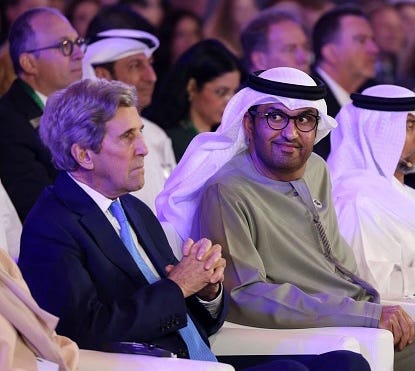This post, a break from India, is an article I wrote for Climate & Capital Media. I argue this is the year when we’ll really start to understand, for better or worse, the role fossil fuels will play in the energy transition. The oil, gas and coal industries account for more than 80% of all greenhouse gas emissions, which are still rising. So few questions are more important to the future of the planet. I’ve made clear my view that we must move to rapidly phase out fossil fuels, but obviously this can’t happen overnight or even in a decade. So how fast and how far can we go? Our efforts to beat climate change hang in the balance.
January is the season for predictions — which, if 2022 taught us anything, have proved vexingly difficult to get right. Nothing, perhaps, is as vexing as answering one of the biggest questions hanging over the world’s response to climate change: Where do fossil fuels fit in?
The burning of ancient fossilized matter is critical to our immediate welfare — but the greenhouse gasses we produce using them are the greatest threat to our future. We’re dependent on them, maybe addicted. Is there a viable path between the economic ruin of going cold turkey and the ecological catastrophe we court by not tapering down much faster?
There may be. The argument goes as follows: pare fossil fuel use to a nub so small that the remaining greenhouse gas emissions can be captured at the source or their warming impact negated by removing greenhouse gasses elsewhere in the atmosphere. At the same time, while conducting the overhaul of our way of life this will entail, we have to contain the economic disruption enough to avoid a massive political and social backlash, boost energy use in developing countries and, not least, keep the money flowing for the transition to a decarbonized world.
As if on cue, the United Arab Emirates, host of the world’s most important global climate summit later this year, has ushered to center stage its candidate to manage this global debate.
Meet Sultan Al Jaber, a 49-year-old, U.S.- and UK-educated wunderkind of Abu Dhabi, the largest, richest, and most powerful of the clan-based emirates that make up the country. The UAE is hosting November’s United Nations gathering, the 28th Conference of the Parties, better known as COP28. Al Jaber, a go-to problem solver for the country’s leader, Mohammed bin Zayed, will preside over COP28 as president.
What makes Al Jaber controversial is that he heads the largest fossil fuel producer in the world, the Abu Dhabi National Oil Company (ADNOC). What makes him unique is he also helms one of the world’s biggest renewable energy investors, Abu Dhabi’s Masdar Clean Energy.
As ADNOC’s senior executive, Al Jaber oversees one of the world’s biggest expansions of fossil fuel production — the UAE’s plan to grow oil output by about 40% to 5 million barrels by 2027. As head of COP28, he’ll coordinate a global effort to keep global warming as close to 1.5 degrees Celsius as possible, the level at which scientists say the world might avoid the worst environmental fallout. Many climate experts, along with the International Energy Agency, say meeting that target means capping global fossil fuel production at existing levels.
Some of this tension can be reconciled, believe it or not. For as long as the world needs oil and gas — which will be a long time even under the most ambitious transition scenarios — it makes sense to get it from the most efficient, least greenhouse gas emitting sources. Abu Dhabi increasingly provides just that by powering some of its offshore oil facilities with solar power and reducing the flaring of natural gas that accompanies oil production.
Still, it’s not a great look for the host of a climate conference. Environmental groups and climate activists are furious. They worry COP28 will turn into a showcase for fossil fuel producers, even more so than COP27 in Egypt last year.
Yet, unlike Egypt, Abu Dhabi has an impressive clean energy record. The UAE is a global leader in clean nuclear and solar power generation at home. It has invested heavily in renewable energy projects from India to the United Kingdom. The country was the first member of OPEC, the Organization of the Petroleum Exporting Countries, to undertake a net zero-emissions target. That set an example for Saudi Arabia, the most significant member of the group, which followed soon after.
Abu Dhabi is also an early entrant in two other technology races that will influence the speed of the energy transition and the role fossil fuels will play: Hydrogen and carbon capture.
Neither are ready to dent global emissions soon. But for the first time, real money is being spent figuring out how well they work and whether they can grow into substitutes for fossil fuels or a remedy for the emissions that arise from their use.
Climate and infrastructure bills in the U.S. are pouring money into pilot and commercial projects to see if they scale. China, Europe, India, Japan, Australia, Saudi Arabia, and even African nations like Namibia are among a coterie of other countries making substantial pushes into hydrogen, carbon capture, or both.
The UAE has big plans for hydrogen production. And it got into the carbon capture game way back in 2016, using the technology to reduce the greenhouse gas emissions of a massive steel factory.
But here’s the catch: Abu Dhabi uses these initiatives to produce additional fossil fuels. The captured carbon is injected into oil wells to pump more barrels of oil. The hydrogen the UAE is most interested in producing would be manufactured from natural gas rather than using renewable energy in a carbon-free process.
Here lies the challenge for the UAE and Al Jaber in overseeing the upcoming COP28. A key part of this year’s summit will be the official international assessment of progress toward the Paris goals. This global “stock-take” will, without question, underscore just how far behind the world is falling as emissions continue to rise.
Capturing carbon from smokestacks and steel mills and sucking greenhouse gasses from the atmosphere can ease the transition. They may even allow a bit of fossil fuel use permanently. This doesn’t change the fact that fossil fuels are the most significant cause of the global warming problem. Moving decisively to reduce their use is the fastest way to solve the problem.
How to do that while protecting the poor and vulnerable — those most exposed to energy price spikes and fuel shortages — is more a matter of boosting financing for fossil fuel alternatives and clearing away obstacles to getting them up and running than it is slowing down the energy transition. This is another area where Abu Dhabi, which has close ties to the developed and developing world, could make a huge impact at COP28. That will require the developed world to step up with far more funding at far lower interest rates.
To keep their balance as they cross the chasm below, with each careful step, tightrope walkers keep their heads up and their eyes focused on where they’re going. A world with few, if any, fossil fuels is where we have to head, with every step, if we’re to avoid the worst fallout of climate change.
Few know the landscape of fossil fuels to one side and clean energy to the other better than Sultan Al Jaber. The question is whether he can convince other nations to follow his direction.







